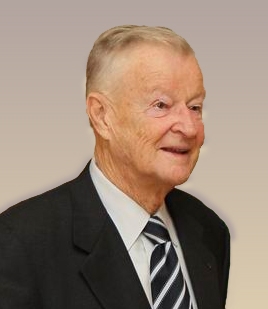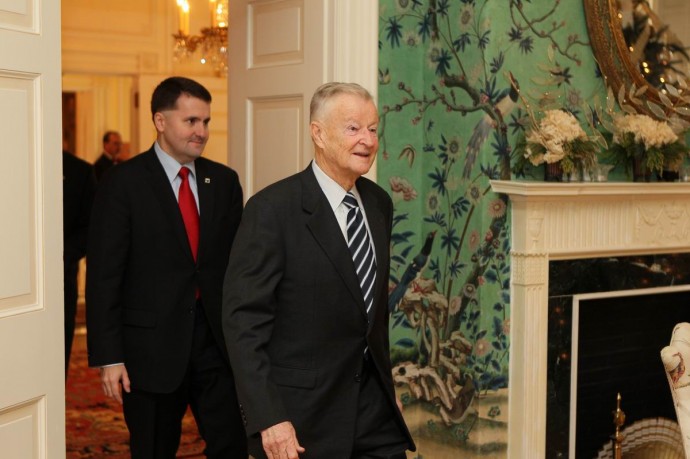(NEW YORK) MintPress — Zbigniew Brzezinski is not one to mince his words. When asked by journalist Fareed Zakaria on CNN this weekend if he prefers President Obama to the alternative in the 2012 election, the former National Security Advisor to President Jimmy Carter from 1977 to 1981 was blunt in his response.
“Oh, without a question, without a question. I mean, look at those Republican debates. I must say I literally feel embarrassed as an American when I see those people orate,” he said.
“One of them sounds like a medieval Savonarola. Another one is trying to explain why he has some of his wealth located in the Cayman Islands. And someone else would go back to 1780. And then there is someone who is using his credentials as a repudiated speaker of the Congress to be president.”
Brzezinski has been out of office for over 30 years, but the political scientist and global strategist is still as active and relevant as when he was brokering the Camp David Peace Accords between Israel and Egypt. He is currently Robert E. Osgood Professor of American Foreign Policy at Johns Hopkins University‘s School of Advanced International Studies, a scholar at the Center for Strategic and International Studies, and a member of various boards and councils.
Brzezinski, who was born in Poland, in fact acted as the lead political advisor on foreign affairs to President Obama during his 2008 campaign and is still unofficially advising him on foreign policy today. Brzezinski’s advice, based on what he asserted in his interview with Zakaria, is likely to shape Obama’s near term actions in the Middle East as well as his campaign platform.
Global vision
Brzezinski has consistently urged a strong U.S. leadership role in the world and warned against unilateral policies that would destroy U.S. global credibility and risk isolating it internationally.
In his latest book, “Strategic Vision: America and the Global Crisis of Power,” Brzezinski discusses a world without American power and maintains there would be a decline in international cooperation as well as grave instability.
While serving in the White House, in addition to helping obtain the Israel-Egypt peace treaty, Brzezinski emphasized human rights as a means of putting the Soviet Union on the ideological defensive. He actively supported Poland’s opposition Solidarity movement , provided covert support for national independence movements in the Soviet Union and played a key role in normalizing relations between the U.S. and China.
After he left office, Brzezinski remained involved in Polish affairs. He criticized Warsaw’s imposition of martial law and briefed Vice President George H.W. Bush before his 1987 trip to the country, which helped revive Solidarity. He also warned against post-Cold War exuberance.
He publicly opposed the Gulf War and expanded on his views in his 1992 book Out of Control.
Yet he was vocally critical of the Clinton administration’s reluctance to intervene against forces from Serbia in the war in Bosnia and later came out in support of the 1999 NATO bombing of Serbia during the Kosovo war . He also became one of the biggest advocates of NATO expansion after former KGB agent Vladimir Putin came to power in Russia.
Post 9/11
After the September 11 attacks in 2001, Brzezinski was criticized for the role he played in the 1980s, after the Soviet invasion of Afghanistan, in the formation of the Afghan Mujahideen network, some of whom later formed the Taliban and al Qaeda. He maintained that the blame should be directed at the Soviet Union.
He was a leading critic of George W. Bush’s war on terror and wrote two books condemning Bush’s foreign policy. He also defended the book The Israel Lobby and U.S. Foreign Policy and openly criticized the 2003 invasion of Iraq.
In August, 2007, Brzezinski endorsed then Democratic presidential candidate Barack Obama.
A strange, new Middle East
In endorsing him, Brzezinski said “What makes Obama attractive to me is that he understands that we live in a very different world where we have to relate to a variety of cultures and people.”
In 2011, with the Arab Spring underway, Brzezinski supported the NATO intervention against Muammar Gadhafi’s forces in the Libyan civil war, calling non-intervention “morally dubious” and “politically questionable.”
Yet he is unfaltering in his opposition to military engagement with Iran to prevent it from developing its nuclear capability. Brzezinski was in the White House when Carter struggled to free U.S. hostages in Tehran.
Weighing in on Iran
Speaking to Zakaria, he cautioned,
“We don’t need to go to war. And we have to make that very clear to our Israeli friends. We’re not going to go to war. They’re not going to go to war by flying over our airspace over Iraq. We’re not going to support them.”
Although Brzezinski is pro-Israel, he is a so-called Liberal Zionist, which means advocating, among other things, the need for Palestinian statehood in order to form a more democratic society in Israel and equal rights for Arab citizens of the country. He is at strong odds with Prime Minister Benjamin Netanyahu over Israel’s Iran policy.
He continued, “ If they do it, they will be on their own. The consequences will be theirs, because the price we’ll all pay, based on a massive war, which the Iranians interpret as being done with our connivance, will be disastrous for us in Afghanistan, in Iraq, in the terms of oil, but also in the Middle East more generally.”
Steering the course in Syria
Brzezinski was also wary of direct conflict with Syria, where the government has been cracking down on opposition protesters for nearly a year. “ I would take the position that we will support anything that the Turks and the Saudis jointly contrive, because they’re our friends in the region,” he told Zakaria
That could complicate U.S. relations with Russia, which fears Saudi Arabia’s role in backing radical Muslim members of the Syrian opposition. Brzezinski’s warnings could also trigger somewhat of a power struggle with Secretary of State Hillary Clinton, who said last week that she is betting against Syrian President Bashar al-Assad.
In contrast, Brzezinski told Zakaria, “We shouldn’t be careless in any comparisons between Assad and Gadhafi. Gadhafi was far more vulnerable than Assad is. I think it’s far from clear yet that Assad can, in fact, be overthrown.”
When Brzezinski was in the Carter White House, he and then Secretary of State Cyrus Vance were increasingly at odds over the direction of foreign policy. After a failed mission to rescue the hostages in Iran, which Brzezinski planned, Vance resigned.



